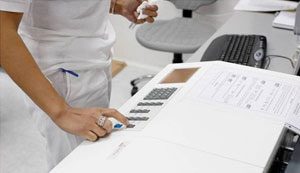Quality management
Quality management involves the following:
1. Quality control
Quality control includes three levels of control and is performed in accordance with control plans which we define together with our customers. Our goal is to modify our standards according to the standards and requirements of all our customers and, at the same time, to comply with our regulations, as well as with the European ones.
Our standards include ISO 9001:2008 and ISO 22000:2005, FSSC 22000 and HACCP.
RAW MATERIAL AND PACKAGING INPUT CONTROL
The input control includes all raw materials and packaging entering the production process. The emphasis is especially put on water quality control. Treated water directly used in the production process is tested.
Apart from the raw materials used as ingredients in the production, a regular input control is performed on the non-pasteurized beer delivery.
As far as packaging is concerned, it is of most importance to perform the input control of packaging in direct contact with the product itself.
PROCESS CONTROL
Process control includes monitoring the parameters during production itself in order to provide quality and regularity of the final product, and to prevent the product not satisfying all the defined standards reach the customer. Some parameters, such as carbon-dioxide and oxigen content and pasteurizing parameters, are constantly monitored. Apart from examining the drink parameters, the process control includes controlling the entire packaging. A very important parameter is the quality of the seam which is inspected by special seaming control equipment. Visual aspect of a can, drying, code quality, even the final packaging quality are inspected.



According to the regulation, all products have to go through the final control – analyzing chemical and microbiological parameters of the product.
Chemical and microbiological laboratories are equipped for all raw materials and final products analyses.
The chemical laboratory is well equipped, starting with the basic volumetry devices, basic pH, conductivity and dry matter content control instruments, to the specific analyzers for the beverage industry (carbon-dioxide content in the final product, air content inside the can, inspecting clarity) and spectrophotometer for different analyses. A necessary device is also a data logger which constantly monitors and controls pasteurization process parameters, since this process is the most important for quality and safety of the product requiring such preservation. A seaming control device is also necessary when canning is the primary packaging.
The microbiological laboratory applies all the methods of microbiological analysis required by our regulations, as well as by the principles of good manufacturing and good hygiene practice (GMP and GHP). All the raw materials, semi-products and final products are inspected, as well as washed-out water, air and smears taken from different surfaces, packaging and hands. High-quality substrates and reagents are used in the procedure, as well as modern equipment including:
- Autoclaves for dish sterilization
- Incubators
- Laminar chamber
- Membrane filtration system
- Microscope
and other necessary equipment. With our equipment and human resources, we are able to perform microbiological inspection of different products and thus meet, not only our customers’ requirements, but the needs of all our partners unable to perform these analyses in their own laboratories.
Standards
Introduction of ISO 9001:2008 and ISO 22000:2005 quality and safety standards is underway, although their principles have been applied since the start of the company’s operation. There are records of all our activities which enable us to implement the continuity principle at any chosen time. At the same time we strive to fully obey all the health and work safety standards, as well as the environment protection standards, with intention to implement those as well in the near future.


2. Product safety
- CIP of all equipment used in the production process
- External washing
- Production line hygiene
The latest automated CIP is used for washing and disinfection. Implementing HACCP principles in this area includes defining an adequate washing programme for each object followed by efficiency control of the programme itself. Regular inspection is done after each CIP by performing chemical and microbiological analyses of rinsing water.
As well as CIP, external washing is performed using high-quality food-grade chemicals. Inspection after each external washing does not allow an oversight.
Apart from standard procedures, production line hygiene includes some additional measures. First of all, it includes inspecting and monitoring the microbiology of the environment inside the plant. It is essential for the product safety considering the fact that some harmful microorganisms which can be found in the beverage come from the air itself. We are equipped with a special device for sampling air from all factory sections. Based on the results of the microbiological analyses, we conduct a periodical disinfection of a selected part.
3. Environment protection
The factory is equipped with the facility for technical waste water neutralization. It uses carbon-dioxide instead of a conventional system of inorganic acid neutralization. The waste water quality is regularly inspected at the Public Health Institute.
Another aspect of environmental protection is collecting, disposing and safely destroying waste. Considering the fact that a can is primary packaging material in our production, all waste is appropriately disposed of and transported to be recycled.
